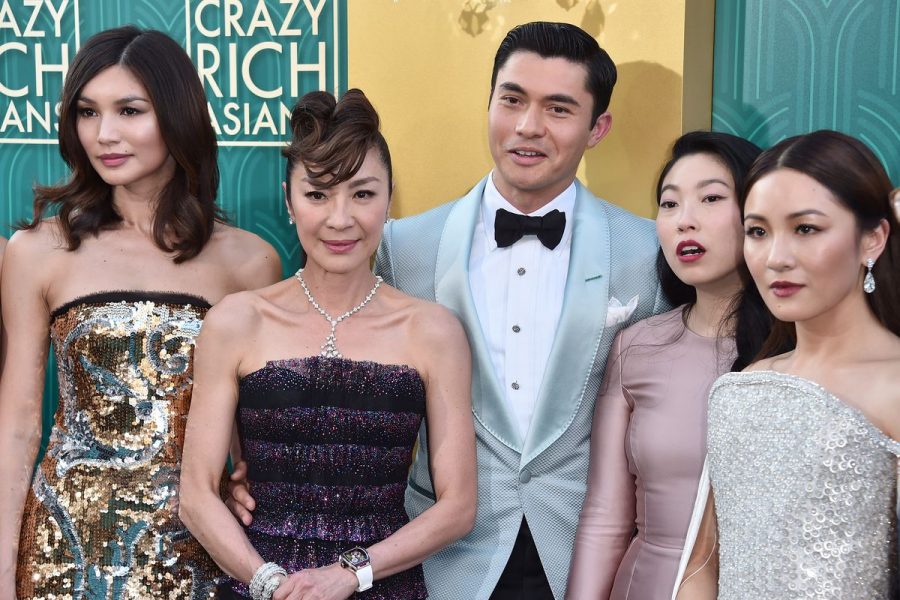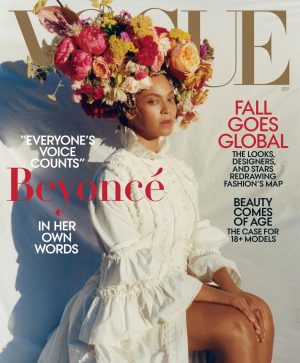Crazy Rich Asians epitomizes the intersection of the East and the West
October 4, 2018
Supplemented by political, historical, and cultural implications, Crazy Rich Asians is a love story at its core. The romantic comedy follows lovers Rachel Chu (Constance Wu) and Nick Young (Henry Golding) from New York to Singapore. Nick reunites with his family and is the best man at his best friend’s wedding. Rachel discovers that the Young family is unimaginably wealthy, as she tackles haters for her American identity and relationship with Nick.
Crazy Rich Asians stunned with the first scene. The movie addresses discrimination against Asians with this opener, yet manages to start off the movie with a lighthearted victory for the main characters, as well as for the invested audience.
In the midst of a downpour, the travel-weary Young family walks into a hotel in London in 1995 and is faced with a group of uncooperative staff. The troop, consisting of the dowager Eleanor (Michelle Yeoh), her young son Nick (Nevan Koit), his cousin Astrid (Amanda Evans), and her mother (Janice Koh), are ushered out of the building and back out into the rain. When the Youngs walk confidently back into the hotel a moment later, following a quick call from Eleanor to her husband, to the great dismay of the hotel manager, the staff finds out that the Youngs are the new owners of the hotel.
The introduction of the Youngs as an aloof and affluent family is balanced by the antics of the children, Nick and Astrid. When Nick walks through the revolving hotel doors, he tracks in mud. Like the child he is in this scene, he proceeds to smear mud across the glossy floor, squeaking his shoes obnoxiously. Of course, his youth and his audacity are immediately endearing. Furthermore, his closeness with Astrid, as evidenced by his excited elbowing, is only the beginning of the authentic family interactions and relationships that are portrayed and developed throughout the movie.
The quiet presence of Eleanor Young creates a high-impact impression, while highlighting the values of traditional Asian culture. Eleanor’s status is evident in the way she holds herself, yet it is very clear that she does not let that get to her head. Someone else in her situation in this first scene may have lost his or her temper and fired the hotel manager. Eleanor remains poised and her civility and control heighten the audience’s respect for her. A notorious trope represents Asians as quiet and submissive, though Eleanor qualifies that depiction. The character of Eleanor as played by Michelle Yeoh is powerful and present. Although she does not speak a lot, her being is definitive and cannot be ignored. She may be harsh at times in the movie, however, her motivations are always apparent. This genuine, multidimensional representation of an Asian character is inspiring and comforting; characters like this are what audiences need.
The first scene may not have contributed to the plot, aside from an introduction to the characters, yet it resonated strongly with my personal experiences as an Asian living in the West. I may not have the advantage of wealth and standing on my side, though I have faced being underestimated, stereotyped, and ignored since childhood. This movie, especially the opening, provides a message to its viewers: you are here and no one can take that away from you.
One of the issues this movie tackles is cultural differences. This movie spotlights the lives of the “crazy rich” in Singapore, however, the main character Rachel Chu is a mere professor of economics with no father, much less a family fortune to her name.
Although Rachel is the protagonist of the story, the wealthy are not all depicted as aggressive snobs. The diversity within the cast is laudable and lends credibility to the characters and their stories.
Eleanor’s (and all of Singapore’s elites’) disdain of Rachel stems from her status as an outsider, a middle class worker, and, perhaps above all, an American. This movie institutes a conversation about the evolution of ideals as they travel across the globe and across generations. Traditional Asian customs are lost and traditional Asian mindsets are transformed. The various perspectives of this can be seen in many characters throughout Crazy Rich Asians. Nick Young represents an intersection of these beliefs; this state of limbo causes him to be slightly out of touch with reality and its consequences. Oliver (Nico Santos) and Araminta (Sonoya Mizuno) illustrate the open mindedness of youth, as they welcome Rachel to Singapore with open arms and become her fast friends. Nick’s grandmother, Ah Ma (Lisa Lu), is revealed to be a stickler for tradition. Although she does not blatantly ignore or reject the ambition and individuality that she associates with Americans, she clearly does not approve.
These characters and their opinions bring to light a greater conversation among immigrant families in America. Maintaining tradition and not forgetting one’s origin while being open to a change in lifestyle and mindset is a balancing act that is central to American life. This arouses conflicts that are not often addressed in such a masterful way.
The role of family is key to all cultures, though, in Crazy Rich Asians, the family dynamics illustrated are both familiar and foreign.
There is one scene where the Young family, and Rachel, gathers around a table, making dumplings. Nick, Oliver, and Astrid (Gemma Chan) take turns explaining the significance of the custom in their personal experiences. For me, the scene is a familiar one. I could feel the grit of the excess flour on the dumpling dough and the squelching of the colorful filling. The pervasive sense of companionship is palpable and heartwarming. Just as this scene allows Asian viewers to smile and reminisce, it provides further insight into Asian culture for viewers who are unfamiliar with what it means to be Asian.
Perhaps my favorite character in the movie was Rachel’s mom (Tan Kheng Hua). When she appeared at Peik Lin’s house in Singapore to keep her devastated daughter company, I was moved to tears. The moment when Rachel linked arms with her mother as she left the mahjong game with Eleanor drew more tears. The chemistry between Constance Wu and Tan Kheng Hua is so authentic and relatable for me. I had never seen such an accurate reflection of my own relationship with my mother anywhere else.
The discography of Crazy Rich Asians is composed of upbeat Chinese songs, as well as emotionally resonant cover songs. The lesser known female singers provided stirring renditions of familiar songs, such as Katherine Ho in her performance of Coldplay’s “Yellow.” The song carried the story to its end, offering a sense of triumph and pride. A familiar song to Westerners, “Yellow” is placed under a different light in this movie. Ho croons the song’s lyrics in Mandarin Chinese in a way that is simultaneously comforting and assertive, just as the movie was brimming with happiness and pride for many Asians living in the West. The meshing of Western culture with that of Asia was incredibly powerful and authentic, resonating strongly with Asian Americans like myself.
I will never forget Crazy Rich Asians and what it is doing for me. The acting and the storyline may not be very special, though the experience of seeing the movie most definitely was. The characters and the small details in their interactions caught my eye and I am grateful. 2018 has been a year of marvels and this movie is yet another landmark for the world to see. In the words of Gemma Chan, who plays Astrid, “we’re here.”



